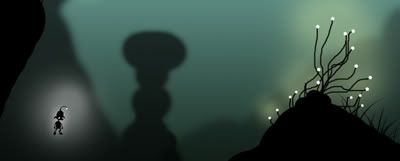This small yet cloying
sample of The Binding of Isaac is an admittedly incomplete experience of the game, but due to its procedurally-generated nature there is no such thing as a complete picture; only random cross sections cut at unpredictably obscure angles.
The game is reminiscent of the 8- and 16-bit
Zeldas in its mechanics, enemy design and level design, although dungeons are made up of never-the-same-twice rooms and the whole thing is draped in a nightmarish basement aesthetic loosely inspired by an ancient
story about child sacrifice.
The Binding of Isaac almost overcomes its lack of melee combat by compressing the ranged attacks to just the four cardinal directions, placing additional importance on aligning yourself with your targets either horizontally or vertically, and complicating this process using various static obstacles (such as piles of degrading faecal matter). When enemies close in on you it is possible to move and shoot in different directions, but I did encounter the odd occasion where the available space was too confined, the enemies advanced too quickly and my fire rate was simply too slow. Randomisation has its drawbacks.
Its fictional premise is unique compared to most games and the intro cinematic was certainly entertaining, if a little overt in its Biblical themes, but I sense that it takes the
Shadow of the Colossus /
Metroid approach of using cinematic sequences to merely bookend the lengthy action part of the story. That is to say it opens with a 'premise cinematic', lets you spend a very long time
doing stuff in response to that premise and closes, when you reach your goal, with a 'job done cinematic'. I may well be wrong (please correct me if I am), but that's how it appears from the demo. It's an effective enough structure (and has been touched upon
here) but does leave the bookends feeling like exposition overkill when the rest of the game's narrative is delivered so sparingly.
For all its flaws (which I tend to dwell on when I deconstruct a game)
Isaac is a shining example of a top-end indie game which demonstrates a strong understanding of the challenges presented by overhead camera angles in 2D games.
It's dirt-cheap on
Steam (with soundtrack available too) and the free demo is playable in your browser on
Newgrounds.


